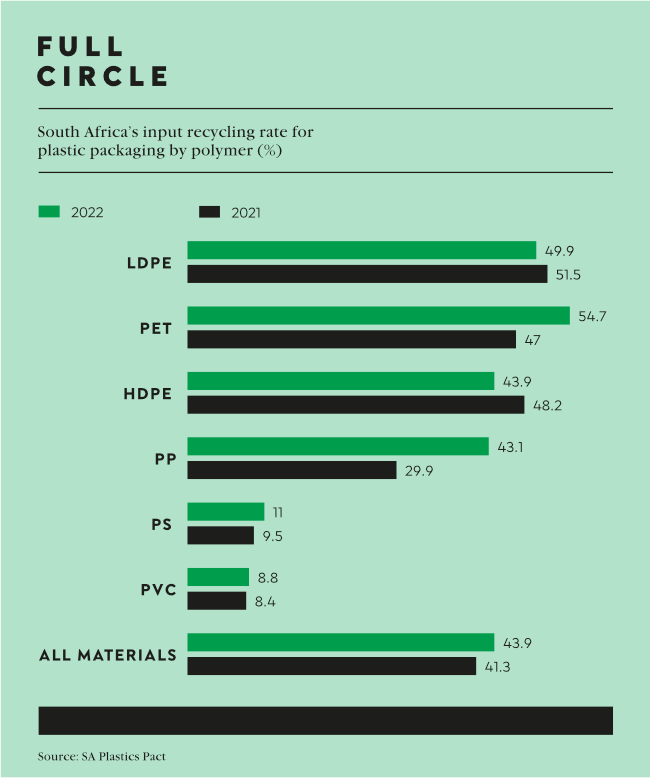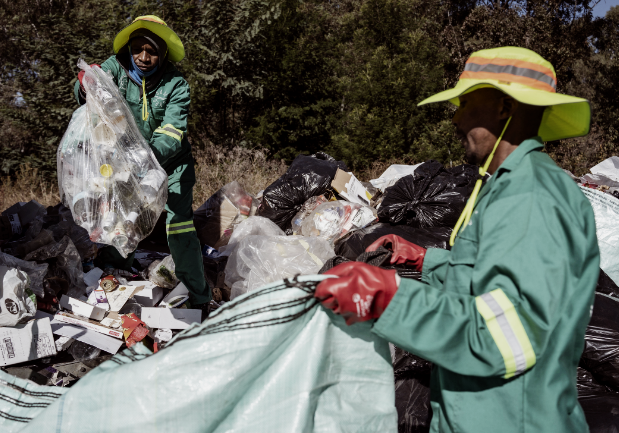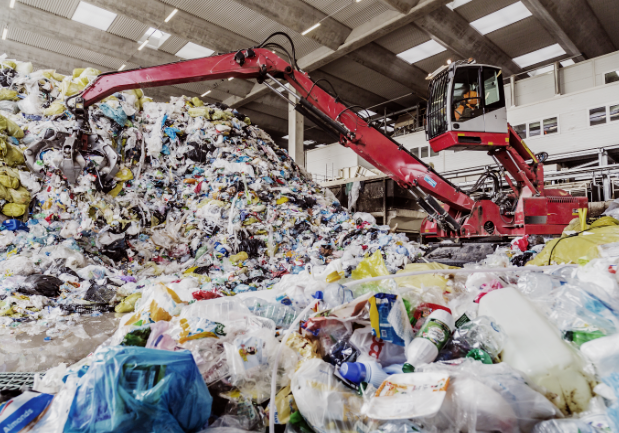South Africa is grappling with a modern-day challenge that threatens its environmental well-being – plastic pollution. As the scourge of plastic waste continues to impact on ecosystems and communities, the state of the country’s plastic recycling industry – albeit higher than the global average – has become a focal point for sustainable development.
The SA Plastics Pact, established in 2020, endeavours to hold its members – comprising South African businesses and organisations – accountable to specific circularity targets set for 2025. These targets include a reduction in unnecessary or problematic plastic packaging, ensuring that 100% of plastic packaging is reusable, recyclable or compostable; achieving a recycling rate of at least 70% for all plastic; and incorporating an average of 30% recycled plastic across all packaging materials.
The SA Plastics Pact says South Africa is among the best globally in terms of mechanical plastics recycling. ‘First World countries with sophisticated collection systems are not achieving anything near what South Africa has achieved, especially with regard to thin polyethylene films and contaminated post-consumer plastics. Across South Africa, popular materials are collected and recycled into new raw material. However, lots of waste, including recyclable plastics waste, is still ending up in landfill and in the environment.’

Indeed, South Africa’s landfill sites are still stretched to capacity, with the waste-management industry warning that country is dangerously close to ‘day zero’, while ‘the impact of the pandemic saw a significant rise in the utilisation of single-use plastics, as well as a decline in collection and recycling rates, and has created a massive increase in the use and disposal of PPE waste’, says Kate Stubbs, marketing director at waste-management company Interwaste. ‘All of which is contributing to a mounting problem.’
South Africa has made commendable strides in recent years to address the plastic pollution crisis. Initiatives include the extended producer responsibility (EPR) programme – implemented in November 2021 by the Department of Forestry, Fisheries and the Environment – which makes manufacturers responsible for the entire life cycle of their products.
As Cheri Scholtz, CEO of producer responsibility organisation (PRO) PETCO, explains in JSE Quarterly, this means that producers must assume responsibility for their products up to, and including, the end-of-life stage of their product cycle.
‘The producer for packaging is either the brand owner of the products using the packaging; the retailer – in the case of house brands; or the importer of goods contained in packaging,’ she says, adding that South Africa’s legislation ‘moved from voluntary to mandatory EPR amid increasing consumer and governmental pressure on brands to ensure end-of-life solutions for their products beyond consumer use’.
Formerly a voluntary initiative, EPR was managed by different PROs. Although the fundamental nature of oversight remains intact, a significant shift has occurred. Now, every company or brand engaged in the production or importation of any type of plastic packaging for distribution is mandated to remit an EPR fee per ton. Additionally, strict government-defined targets for annual collection and recycling have been instituted, compelling compliance from businesses over the upcoming five years.
In another noteworthy move for environmental stewardship, Plastics SA announced in April last year that the Association of Rotational Moulders of Southern Africa, the Expanded Polystyrene Association of Southern Africa, and Kainotomia Polymers had pledged their commitment to Operation Clean Sweep – spearheaded by leaders in the plastics industry and which seeks to combat plastic pollution in oceans and rivers.
July saw the SA Plastics Pact expanding its alliance, with Food Lover’s Market, Naspers, Sir Fruit, the Consumer Goods Council of South Africa (CGCSA), and the City of Johannesburg joining as signatories. Food Lover’s Market stands alongside other retail giants such as Pick n Pay, Woolworths, Spar and Clicks, while Naspers aligns with Media24 and Takealot, which are also active signatories.

With a robust membership of more than 9 000 companies, the CGCSA, as a representative body, holds considerable sway in influencing circularity for plastic packaging in South Africa.
This collaborative effort between industry leaders, businesses and organisations underscores a collective commitment to responsible plastic use and environmental sustainability. As these initiatives gain traction, they represent significant strides toward creating a more circular and eco-conscious approach to plastic packaging in South Africa.
However, one of the key challenges that remains is insufficient collection and sorting infrastructure. While urban areas often have relatively well-established recycling systems, rural and peri-urban regions face significant barriers. Limited access to collection points and recycling facilities makes it challenging for residents in these areas to participate actively in recycling efforts.
‘In order to address the South African conditions you need to look at the local context and develop solutions that will fit our culture, infrastructure, socio-economic conditions and size of the problem,’ says Anton Hanekom, executive director of plastics industry representative body Plastics SA. He adds that 39% of the country’s population does not have access to waste-management services. ‘Mixed waste is collected and sent to landfills, so we need to collect post-consumer waste mainly from landfills for recycling.
‘We recycled around 22% of all locally made plastics products put on the market in 2022. This in the context of a broken waste-management system where recyclable material is mixed with organic waste, compacted and landfilled. Sought-after materials are then collected, sorted, sold to buy-back centres, sorted again, baled and sold to recyclers that will sort again, wash and repurpose,’ he says. ‘We will not be able to effectively implement circularity in South Africa if all stakeholders are not playing their part in separating recyclables as early as households in the process; if all the recyclables – all waste streams – are not separately collected and sorted for recycling, reuse, refill or whatever means of circularity we choose.
‘Consideration must also be given to the development and transfer of current traditional and future advanced recycling technologies, where relevant. All of this must be done in the context of South Africa’s socio-economic circumstances.’
Community engagement is a cornerstone of successful recycling initiatives. Empowering communities, particularly in underserved areas, by providing accessible recycling facilities and educational programmes, can lead to increased participation. Local governments and non-governmental organisations can play a crucial role in fostering community ownership of recycling projects.
The involvement of the private sector is pivotal in enhancing the plastic recycling landscape. Additionally, partnerships between government and private enterprises can spur innovation in recycling technologies and infrastructure.
As South Africa continues its journey towards a more sustainable future, the imperative for sustained collaboration, increased investment and stringent regulatory enforcement becomes apparent. Equally crucial is the need for fair compensation for those who occupy a foundational role in the industry.

As of 2022, an estimated 90 100 informal jobs were being sustained within the collection industry, encompassing roles held by waste pickers and employees of smaller entrepreneurial collectors. In addition to the Waste Picker Integration Guideline for South Africa, which laid the groundwork for essential legal requirements, compelling municipalities and industries to incorporate reclaimers, a South African Waste Picker Registration System (SAWPRS) was established to formalise and streamline the involvement of waste pickers.
In the 2023 edition of Business Day Earth, Melanie Samson, who has played a pivotal role in spearheading the development of a framework aimed at integrating waste pickers into both the industry and municipalities, emphasises that without the invaluable contributions of waste pickers, the recycling industry in South Africa would cease to exist. Yet despite their indispensable role, waste pickers are often inadequately compensated for their efforts.
Just more that 8 220 reclaimers had been fully registered on the SAWPRS and received their registration cards, according to Samson. ‘Registration has made a significant difference to reclaimers – after having been disregarded, excluded, criminalised and harassed for so many years, official recognition of their occupation and contributions is very meaningful to them and has increased their pride in their work. It has also changed how they are seen and treated by others.
‘For example, residents are more trusting and open to engaging reclaimers when they see their registration cards, which has improved reclaimers’ access to materials and working conditions.
‘A number of reclaimers who have shown their registration cards to security and police have averted evictions from areas where they are working and prevented the confiscation of their materials. They have also used their cards as proof of occupation to secure credit and loans.’
While acknowledging the notable progress made, however, Samson underscores that only a small percentage of reclaimers nationwide have had the chance to undergo registration.
Ultimately, South Africa’s plastic recycling industry poses both challenges and opportunities. There is a pressing need for a holistic and collaborative approach to further develop the recycling sector. By investing in infrastructure, education and fostering partnerships with the private sector, South Africa can pave the way for a sustainable future, where plastic waste is minimised, and the circular economy thrives. However, the time to act is now, for the benefit of the environment, economy and future generations.
















